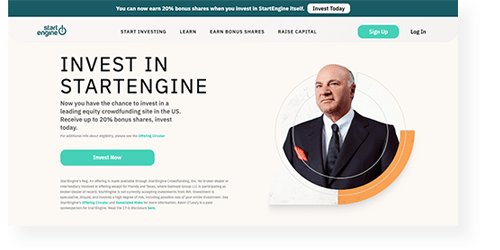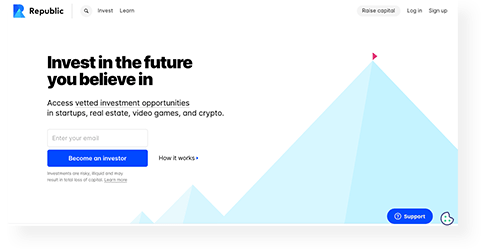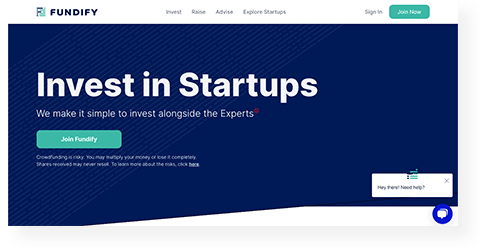Community round: Why settle for 1 angel when you can have a choir?
Over the past few years, the business of raising startup capital has changed drastically. Round valuations have skyrocketed, and people have started...
6 min read
 Jeff Erickson
September 20, 2022
Jeff Erickson
September 20, 2022
Equity crowdfunding is a relatively new addition to the toolset founders have available to raise capital for early-stage startups. It opens up a whole new market of potential investors who have never before had access to investments in startup equity.
Instead of relying solely on individual angel investors or venture capitalists, equity crowdfunding allows you to include loyal customers, social media followers, and other community members in your fundraising process.
But is equity crowdfunding really a viable way for your business to raise capital? We’ll take a closer look at how equity crowdfunding works and help you determine whether or not it’s a good match for your startup’s current needs.
Key takeaways:

One of the offshoots of the Jumpstart Our Business Startups Act (JOBS Act) is a regulation that allows companies to use crowdfunding as a source of investment capital. It’s technically called “Regulation Crowdfunding,” but you might also see it referred to as “Regulation CF” or “Title III Crowdfunding.”
In a nutshell, it basically allows a company to raise capital from both accredited and non-accredited investors.
In theory, the equity crowdfunding process is pretty simple. A company seeking to raise capital creates a profile along with the appropriate disclosures and filings using a licensed crowdfunding platform.
The company states a minimum and maximum funding goal, and individual investors send payments which are initially held in escrow. If the minimum funding goal is met, the company receives the investment capital. If the minimum is not met, the investors get their money back.
If you’re a founder considering equity crowdfunding as a way to raise capital, there are a few requirements you should be aware of upfront.

Are you comfortable with the requirements above and interested in raising capital through equity crowdfunding? Great! Let’s look at a few indicators that will show whether or not equity crowdfunding is a good match for your needs.
Does your company have a loyal customer base or social media following? Do your fans and followers love what you do and help you grow your business organically by openly posting reviews and amplifying your social media posts?
If your company has this type of devoted following, you may have some success marketing your equity crowdfunding campaign to your existing community.
Remember, equity crowdfunding relies on many small investments from private individuals, so if you have tons of loyal fans who would happily invest a hundred dollars just to be part of your journey, you’ve got a great foundation for a crowdfunding campaign.
While you can have a very profitable company that sells ordinary or mundane products like nuts and bolts, successful equity crowdfunding campaigns often feature novel, unique, or otherwise exciting products.
If people have an emotional association with your brand or product, they’re much more likely to open their wallets and put some money on the line. If your followers frequently post about how they “love” your solution, and they voluntarily share it with their peers, that’s the type of excitement you’re looking for here.
Because equity crowdfunding, by design, involves many small investors, you end up distributing many small equity shares to many individuals. As a result, no single investor gets a huge stake in your company.
Many founders choose to roll an equity crowdfunding round up into a single line in their cap table.
This is an important benefit for companies that are trying to maintain a balance in the voting rights among their stakeholders. Structure your campaign carefully, however, as voting rights may be assigned to the lead investor.
While equity crowdfunding is a great option for some startups, it’s not a good match for others. Let’s look at a few indicators that may let you know if a different approach is better for your needs.
If you’re thinking that equity crowdfunding might be a quick fix for immediate funding needs, think again. Crowdfunding can take just as long as a traditional priced round with angel investors or venture capitalists.
You’ll need to partner up with one of the crowdfunding platforms, create a profile and provide the required disclosures. After everything is set up, you’ll need to execute a marketing campaign to get the word out about the opportunity. While some companies may see their campaigns go viral and fund quickly, others can take quite a while to reach their minimum funding goals.
Keep in mind that if you do not reach your minimum funding goal by your campaign deadline, it will be canceled and the funds will be returned to the investors.
Regulation crowdfunding is only available to companies that are based in the United States. If a foreign company wants to raise capital through equity crowdfunding, it must register as a business within the United States.
Regulation crowdfunding limits the amount of money a company can raise from non-accredited investors to $5M over any 12-month period. If your funding requirements exceed this amount, you will need to find alternative funding sources.
Since equity crowdfunding became law, dozens of online platforms have arrived on the scene. These platforms must register with the SEC and become members of FINRA.
Here’s a quick overview of a few of the most popular platforms:

Wefunder has been referred to as the “Kickstarter for investing.” The platform has allowed more than a million individuals to invest as little as $100 in the startups they love. They have helped 2,100+ founders achieve more than $533M in crowdfunding, and those founders have gone on to raise more than $5B in subsequent rounds.
Wefunder campaigns are categorized by industry and region, and their portfolio includes everything from local eateries to flying cars.
Wefunder charges 7.5% of the total successful fundraise. There is no fee to create a profile or list an opportunity.

Kevin O’Leary of Shark Tank fame is a strategic advisor and paid spokesperson for StartEngine. This platform touts more than 750 successful rounds totaling more than $600M raised from more than 950K investors.
Launching a campaign through StartEngine typically takes 4-6 weeks, and the costs are typically between $4K and $10K.

More than $1B has been invested through Republic’s platforms to successfully fund more than 600 rounds. The platform has a very large user base, with more than 2.5M users.
More than 90% of campaigns hosted by Republic have successfully met their minimum funding goals, and the average raise in 2019 was approximately $500K.
Republic strives to maintain diversification across many industries and technologies, so many companies are a good match for its platform whether they’re pre-seed or raising a Series B.

Fundify explains equity crowdfunding this way: “think GoFundMe but for equity rather than charity.” Their website lets investors view active campaigns as well as Fast Pitch Previews, which allow founders to start generating pre-campaign buzz before they launch.
Fundify accepts individual investments as small as $10.
Equity crowdfunding can be a good idea if your business has a strong community of supporters, a unique or buzzworthy product, and funding needs that align with the $5M annual cap. However, it requires significant time, effort, and regulatory compliance, so it’s important to assess whether it fits your goals and resources.
Equity funding involves raising capital by selling ownership shares in your business to investors. In return for their investment, investors receive equity, which represents a stake in your company. This can be done through private investments, venture capital, or equity crowdfunding, where businesses attract multiple small investors via online platforms.
You make money from crowdfunding by using the funds raised to grow your business or bring your project to life. Depending on the crowdfunding type, backers may receive rewards, equity, or nothing in return, while you retain the capital raised to support your goals. For equity crowdfunding, you eventually make money by increasing your company’s value or offering returns to investors through dividends or an exit strategy like a sale or IPO.
The main difference is in what backers receive. In traditional crowdfunding, backers typically receive rewards, products, or support a cause without expecting financial returns. In equity crowdfunding, backers invest in exchange for ownership shares in the business, giving them a financial stake and potential returns if the business succeeds.
Equity crowdfunding has opened up a whole new path for founders to raise capital for their early-stage startups. As with other fundraising techniques, there is still plenty of work to be done and hurdles to overcome, but it has definitely become a viable and attractive alternative for some founders.
One asset that can help you succeed in equity crowdfunding is a rock-solid financial model. With a good financial model, you can accurately communicate your startup’s current financial position and your strategies for future growth.
If you need help building a great financial model for your startup, reach out to Forecastr today.
Get notified about new events, free resources, and fresh content

Over the past few years, the business of raising startup capital has changed drastically. Round valuations have skyrocketed, and people have started...

So you’ve nailed down your business plan, you’ve got a solid proof of concept, or maybe even a working minimum viable product. You’re getting great...

A financial model can make or break your fundraise. Your model is the backbone of data behind what is otherwise a well-rehearsed pitch for a cool...